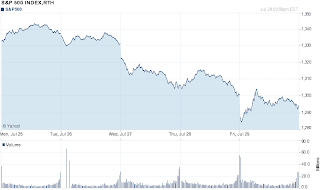US markets fell on Friday because of the inability to reach an agreement on the debt ceiling, and the weaker-than-expected GDP data. The S&P 500 fell 8.39 points or 0.65% to 1,292.28. The Dow dropped 96.87 points or 0.79% to 12,143.24. For the week, both the S&P 500 and the Dow fell 3.9%, the worst week for both indices this year. For July, both indices fell 2.2% for the month.
US markets fell most of the week because of the inability of the Democrats and Republicans to reach an agreement on the debt ceiling. Markets were presented with ugly economic data on Friday, since US 2nd quarter GDP was 1.3%, lower than the 1.8% economists expected. In addition, 1st quarter GDP was revised down from 1.9% to 0.4%.
Markets had received a boost on Thursday, when US initial jobless claims fell 24,000 to 398,000. It was below the important 400,000 level, and lower than the 415,000 that economists expected. In addition, US pending home sales increased 2.4% in June, the second monthly increase.
Gold soars to record highs
Because of the crisis surrounding the US debt ceiling, gold reached several record highs this week. For the week, December gold futures rose $15 or 0.93% to settle at $1,631.20. It reached as high as $1,637.50, a record high.
Euro zone problems persist
As the world was focused on the US debt ceiling, Moody's on Friday warned that it could cut Spain's credit rating from its current level of Aa2. This followed Moody's move on Monday to cut Greece's rating further into junk territory.
Looking ahead to next week
The spotlight is on the US, as the country faces a August 2nd deadline to increase the debt ceiling. An agreement before the deadline should cause a relief rally. However, the size of the rally is in doubt, since the 1.3% 2nd quarter GDP growth (and 0.4% 1st quarter growth) will likely hold markets back. In addition, the euro zone could drag markets lower if yields for Italian and Spanish government bonds increase.
Learn how to profit from the incredible increase in the price of gold for only $0.99: http://amzn.to/iPJ5ST
Learn how to profit from the incredible increase in the price of gold for only $0.99: http://amzn.to/iPJ5ST





